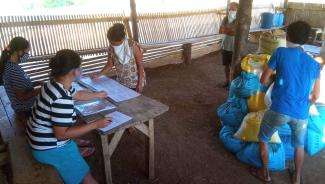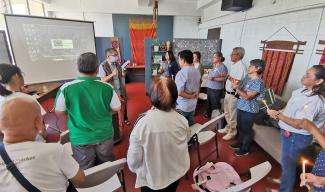Indigenous communities turn to their traditional sources of food to cope with the COVID-19 crisis. For the Serukadang Menuvu Tribe Organization (SMTO) in Don Carlos, Bukidnon, they are now relying on what they are able to get from their waters.
“Pagpanikop nalang sa sapa ang among gisaligan karon, (We are now relying only on what we are able to catch from the streams),” said Datu Benjie Ompigan, their community leader. “Dili pa man mi katanom kay wala pay ulan. (We could not plant yet because it hasn’t rained).”
In the past two years, the SMTO had embarked on a series of ancestral land reclamations, gaining the ire of land leaseholders. This has resulted in their being banned from being hired as farm workers in their neighboring areas. The mobility restrictions because of the COVID-19 crisis only worsened their situation as they can no longer look for work farther from their community.
“Marso pa lang, nahurot na ang among kamoteng kahoy, biga ug kobong gikan sa lasang (The cassava, biga and kobong we gather from the forest already ran out in March),” said Datu Benjie, explaining that when they could not find work anymore, they had already turned to their rootcrops. “Wala pa namo gitandog ang nabilin nga lagutmon kay ayha na namo gamiton kung wala na gyuy makuhaan (We haven’t touched yet what is left of our rootcrops as we reserve it for the time when we’ll really have nothing).”
“Adtong miagi, adunay gihatag nga food pack – unom ka kilo nga bugas, upat ka tinapa, ug upat ka quickchow - ang munisipyo pero walo ra ka household ang nakadawat (The municipal government had given food packs consisting of 6 kilos of rice, 4 cans of sardines and 4 packs of noodles, but only eight households [in our community] received these),” he furthered. “Among gitigom ug giapud-apod sa tanang balay kay aron pud makatak-ang ang uban nga wala natagaan (We collected these items together and re-distributed it to all the families so that the others who had not received anything will also have something to cook.)”
The community has been a long-time partner of The Samdhana Institute, their first project a water system that allowed them to pump up water to their community from a source that would have been a steep trek down the mountainside. Through Samdhana’s Urgent Action Grants, funded by the Marion R. Weber Family Fund-RSF Social Finance, they were able to buy rice at 25kilos for each of the 42 families that are part of the Serukadang community. This is to help them cross over the very lean months that is now being experienced by communities under quarantine brought about by the COVID-19 pandemic. ###
#resilienceinthetimeofcovid19
#weareinthistogether
#COVID-19




